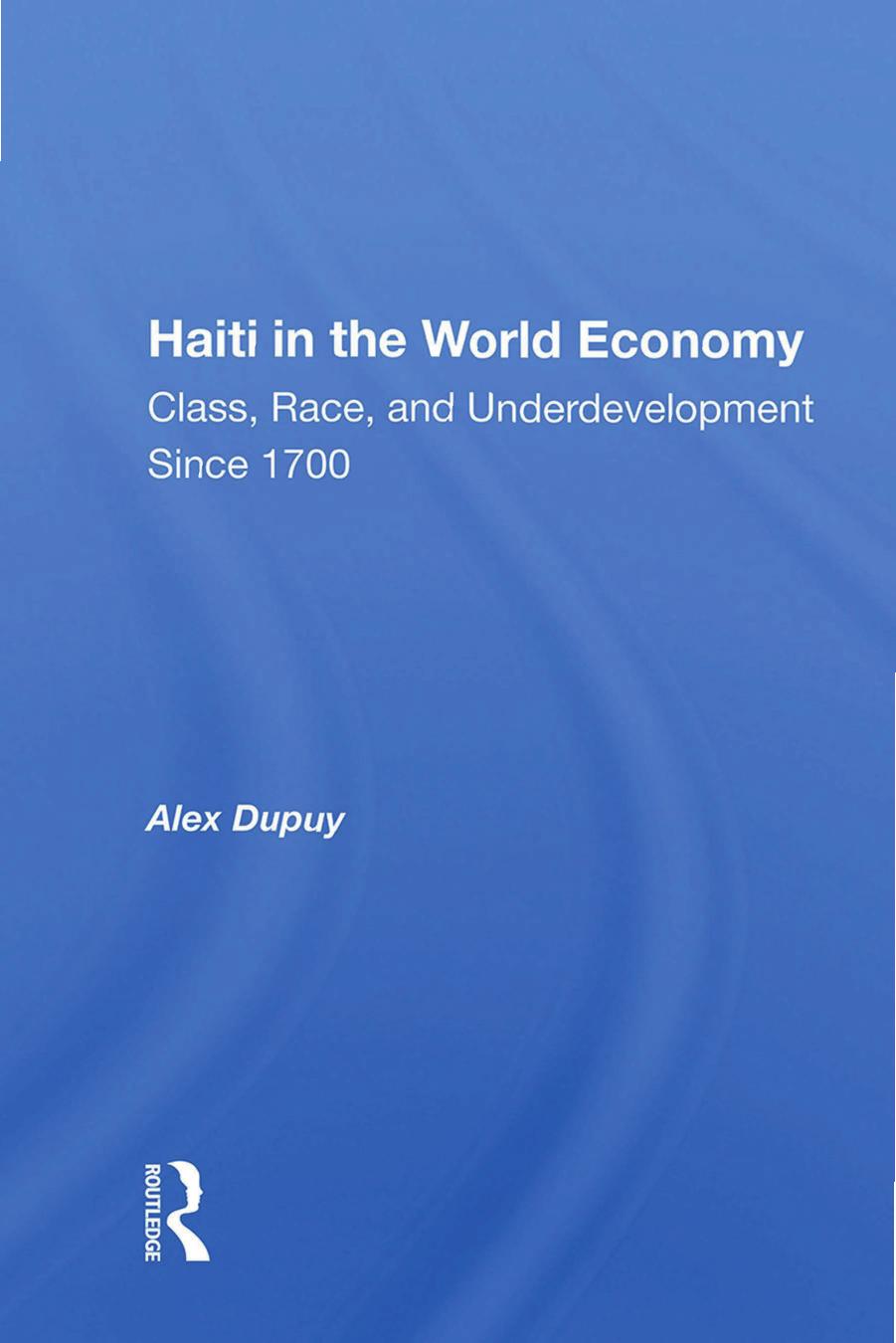Haiti in the World Economy: Class, Race, and Underdevelopment Since 1700 by Alex Dupuy

Author:Alex Dupuy [Dupuy, Alex]
Language: eng
Format: epub, pdf
Tags: Political Science, General
ISBN: 9780429721885
Google: FKubDwAAQBAJ
Goodreads: 48634211
Publisher: Routledge
Published: 2019-04-11T09:47:55+00:00
The Repenetration of Foreign Capital and the Hegemony of the United States
The political instability of the ruling class, the incessant internecine warfare among its members, and their use of the state as a prebend weakened the Haitian commercial bourgeoisie and facilitated the repenetration of foreign capital during the second half of the nineteenth century. Always faced with empty treasuries, even in years of economic prosperity, and unable to rule without foreign financial and military support, succeeding Haitian presidents sought support from among the western powers and the United States. Given the authoritarian form that political power took in Haiti and the means of transferring power, no individual/group in power could dispense with foreign support. In return for such support, Haitian presidents offered many economic, financial and even the possibility of territorial concessions, thereby abrogating the most important protections against foreign economic, and indirectly, political domination adopted by the earlier and more nationalist rulers (Dessalines, Christophe, Pétion) immediately after independence.
No territorial concessions were ever made to foreign powers, but the suggestion of such a possibility expressed the attitudes of Haitian rulers toward foreign capital, their clear understanding of the rivalries among the imperialist powers, and their shrewdness in playing off one imperialist power against another to their advantage. A few examples will suffice. President Geffrard (1859-1867) sought British support to suppress the insurrection led by Salnave. Salnave (1867-1869) turned to the United States for support by offering to let them establish a naval station at the Môle Saint-Nicolas. President Saget (1870-1874) offered the Môle to the British but Domingue (1874-1876), who overthrew Saget, suggested that the British establish a protectorate over the south in return for their support. President Salomon (1879-1888), seeking military support from the United States, promised them the Môle Saint-Nicolas and the island of La Tortue, while simultaneously offering to let the French establish a protectorate over Haiti. President Légitime (1888-1889) allegedly offered the Môle to the French, while Hippolyte (1889-1896) sought United States support to overthrow Légitime (Nicholls 1979, 139-140).
But it the presidents succeeded in using the promise of territorial concessions to their advantage, they willingly entered into financial relations with foreign capital and facilitated its reconquest of the economy. The first breach occurred under Boyer when he agreed to pay France an indemnity in return for France's recognition of Haitian independence and the resumption of financial and commercial exchanges. The practice of borrowing money from foreign banks to meet governmental expenses and to repay accrued debts further increased Haiti's dependence on foreign capital, in addition to draining revenues. Moreover, these financial transactions caused fraudulent practices, such as the scandal of 1874-1875 caused by the diversion of most of the 36,500,000 franc debt contracted between the Haitian government and a French bank to pay off commissions, premiums, and bribes (Bellegarde 1938, 131-132; Moral 1961, 49-50).
Foreign governments and capitalists also capitalized on the political and economic vulnerability of Haitian governments to penetrate more deeply the economy. On several occasions foreign governments sent warships to Haiti to force compensations to their citizens or to pay accrued debts.
Download
Haiti in the World Economy: Class, Race, and Underdevelopment Since 1700 by Alex Dupuy.pdf
This site does not store any files on its server. We only index and link to content provided by other sites. Please contact the content providers to delete copyright contents if any and email us, we'll remove relevant links or contents immediately.
Cat's cradle by Kurt Vonnegut(15335)
Pimp by Iceberg Slim(14488)
4 3 2 1: A Novel by Paul Auster(12375)
Underground: A Human History of the Worlds Beneath Our Feet by Will Hunt(12090)
The Radium Girls by Kate Moore(12018)
Wiseguy by Nicholas Pileggi(5770)
The Fire Next Time by James Baldwin(5431)
Perfect Rhythm by Jae(5398)
American History Stories, Volume III (Yesterday's Classics) by Pratt Mara L(5301)
Paper Towns by Green John(5179)
Pale Blue Dot by Carl Sagan(4996)
A Higher Loyalty: Truth, Lies, and Leadership by James Comey(4954)
The Mayflower and the Pilgrims' New World by Nathaniel Philbrick(4495)
The Doomsday Machine by Daniel Ellsberg(4484)
Killers of the Flower Moon: The Osage Murders and the Birth of the FBI by David Grann(4435)
The Sympathizer by Viet Thanh Nguyen(4385)
Too Much and Not the Mood by Durga Chew-Bose(4338)
The Borden Murders by Sarah Miller(4313)
Sticky Fingers by Joe Hagan(4188)
